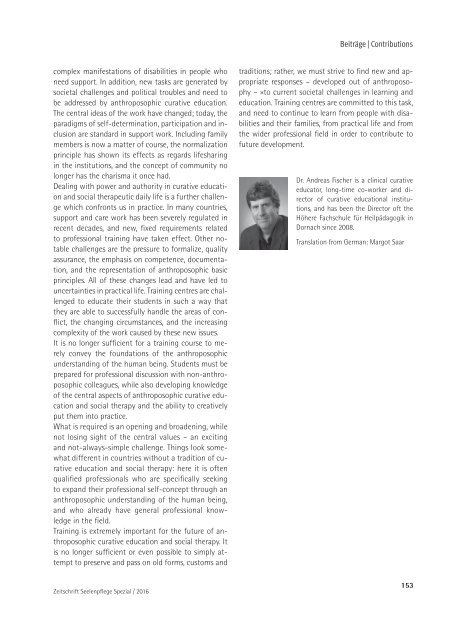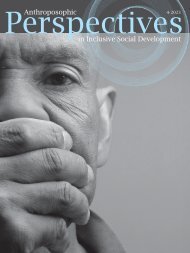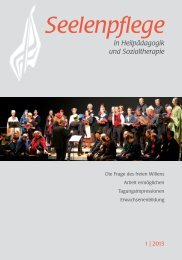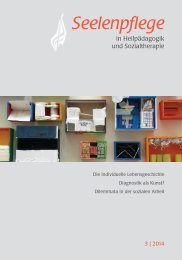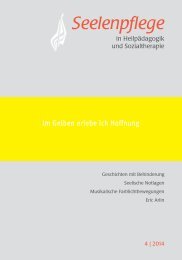Seelenpflege 2016-3-4 Spezial
Seelenpflege 2016-3-4 Spezial
Seelenpflege 2016-3-4 Spezial
Create successful ePaper yourself
Turn your PDF publications into a flip-book with our unique Google optimized e-Paper software.
Beiträge | Contributions<br />
complex manifestations of disabilities in people who<br />
need support. In addition, new tasks are generated by<br />
societal challenges and political troubles and need to<br />
be addressed by anthroposophic curative education.<br />
The central ideas of the work have changed; today, the<br />
paradigms of self-determination, participation and inclusion<br />
are standard in support work. Including family<br />
members is now a matter of course, the normalization<br />
principle has shown its effects as regards lifesharing<br />
in the institutions, and the concept of community no<br />
longer has the charisma it once had.<br />
Dealing with power and authority in curative education<br />
and social therapeutic daily life is a further challenge<br />
which confronts us in practice. In many countries,<br />
support and care work has been severely regulated in<br />
recent decades, and new, fixed requirements related<br />
to professional training have taken effect. Other notable<br />
challenges are the pressure to formalize, quality<br />
assurance, the emphasis on competence, documentation,<br />
and the representation of anthroposophic basic<br />
principles. All of these changes lead and have led to<br />
uncertainties in practical life. Training centres are challenged<br />
to educate their students in such a way that<br />
they are able to successfully handle the areas of conflict,<br />
the changing circumstances, and the increasing<br />
complexity of the work caused by these new issues.<br />
It is no longer sufficient for a training course to merely<br />
convey the foundations of the anthroposophic<br />
understanding of the human being. Students must be<br />
prepared for professional discussion with non-anthroposophic<br />
colleagues, while also developing knowledge<br />
of the central aspects of anthroposophic curative education<br />
and social therapy and the ability to creatively<br />
put them into practice.<br />
What is required is an opening and broadening, while<br />
not losing sight of the central values – an exciting<br />
and not-always-simple challenge. Things look somewhat<br />
different in countries without a tradition of curative<br />
education and social therapy: here it is often<br />
qualified professionals who are specifically seeking<br />
to expand their professional self-concept through an<br />
anthroposophic understanding of the human being,<br />
and who already have general professional knowledge<br />
in the field.<br />
Training is extremely important for the future of anthroposophic<br />
curative education and social therapy. It<br />
is no longer sufficient or even possible to simply attempt<br />
to preserve and pass on old forms, customs and<br />
traditions; rather, we must strive to find new and appropriate<br />
responses – developed out of anthroposophy<br />
– ›‹to current societal challenges in learning and<br />
education. Training centres are committed to this task,<br />
and need to continue to learn from people with disabilities<br />
and their families, from practical life and from<br />
the wider professional field in order to contribute to<br />
future development.<br />
Dr. Andreas Fischer is a clinical curative<br />
educator, long-time co-worker and director<br />
of curative educational institutions,<br />
and has been the Director oft the<br />
Höhere Fachschule für Heilpädagogik in<br />
Dornach since 2008.<br />
Translation from German: Margot Saar<br />
Zeitschrift <strong>Seelenpflege</strong> <strong>Spezial</strong> / <strong>2016</strong><br />
153


